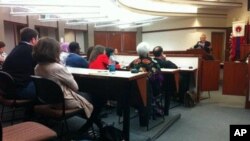The international prosecutor for the UN-backed Khmer Rouge tribunal says all the cases before the court need to be properly considered to lift the “cloud” currently hanging over it.
The court is preparing for its biggest trial to date, for four jailed regime leaders, but it has faced a rash of criticism in recent months over the investigating judges’ handling of two more cases at the court.
The international investigating judge announced his resignation last month over repeated statements by top officials in opposition to cases 003 and 004, and two international judges issued a harsh criticism for the investigating office’s improper handling of court documents related to both cases.
“It is certainly a problem,” Cayley told VOA Khmer in an interview this week at New Jersey’s Rutgers University, where he was holding a talk. “I warned people a while back that if cases 003 and 004 were dealt in that way they were being dealt, we would end up in this situation with fairly critical judgments.”
Investigating judges now must defend their work, he said.
“That’s why the law has to be followed,” he said. “Because then you don’t have to end up constantly explaining why things are being done as they are. Then you don’t end up with people having to resign in the midst of investigations or cases.”
Cases 003 and 004 accuse five senior Khmer Rouge members of atrocity crimes, but their full prosecution would require more indictments, something Prime Minister Hun Sen has said would create instability in the country. Those statements and others, echoed by Cambodian judges, have led to wide criticism that the court is under political pressure to put the cases to an end.
Both cases “need to come to some kind of legitimate conclusion,” Cayley said. “There needs to be due process. The law needs to be followed. The rules need to be followed. Otherwise it’s going to create a huge mess in the court. And nobody wants that on the national side or on the international side.”
Case 002, which charges Nuon Chea, Khieu Samphan, Ieng Sary and Ieng Thirith with atrocity crimes, including genocide, will see its first substantial hearing later this month.
“The commencement of Case 2 is going to be an issue that keeps everybody very busy,” Cayley said. “It’s a case that needs to move forward. I hope that it will lift some of the clouds that are hanging over the court in respect to cases 003 and 004.”
Case 002 will be the most complicated to date for the court, which has only tried Kaing Kek Iev, better known as Duch, for his role as supervisor of Tuol Sleng prison.
Cayley said he believes the case against the four leaders is strong, “because of the size and scope of the crimes that were committed.”
“There is documentary evidence that links them with the crimes on the ground including publications of the Khmer Rouge, and including other documentary evidence,” he said.
“Ultimately, it’s for the judges to decide whether or not these three individuals are connected with the crimes,” he added. “They’re presumed innocent until proven guilty. The prosecution has what’s called the burden of proof. We have to proof these crimes and their connections to them beyond a reasonable doubt. But I have every confidence that we will prove our case at trial.”
Once that case begins, however, the tribunal will still be dealing with pressure to reclaim legitimacy in the eyes of a growing number of critics.
“I find it very disappointing, and I hope that the people at the court are very committed to this, as are people in the government,” said Alex Hinton, an expert in genocide and human rights at Rutgers. “I hope people can come together and reach an understanding that things must proceed in accordance with international standards.”
Sophal Ear, a professor at the Naval Postgraduate School in the US, speaking personally, said, he had filed as a civil party complainant to seek “truth” and “retributive justice.”
Allegations of misconduct at the court affect its credibility, he said. “Are they serious about justice, or are they simply going through the motions to have what appears to be an experience, and to spend $150 million, possibly $250 million, in contributions from the world in the pursuit of justice?”
Sophal Ear said the court could regain confidence from people by moving forward on Cases 003 and 004.
“The actions of the Khmer Rouge tribunal ought to be based on a legal basis, and not on a political basis,” he said. “And right now it appears that things have proceeded on a political basis.”
Tribunal and government officials maintain that the court has not been under political pressure and is working to complete its work independently.
Sophal Ear spoke at Bard College in New York, where he was scheduled to give a presentation on the tribunal to students and professors.
Peter Maguire, a trustee at the college who organized the talk, said the UN must “finish what they’ve started.”
“I am shocked by how slow they’ve gone, especially when they know they have a limited time,” he said. “They know they have limited resources. They know they have limited political will. My feeling would be that they would be pushing as quick and as hard as possible to complete the trial of the senior leaders. And they haven’t.”




